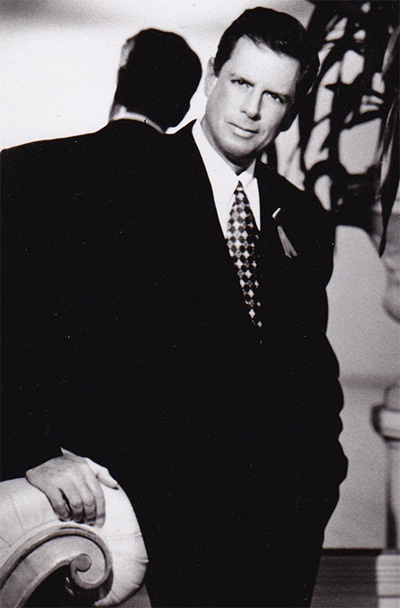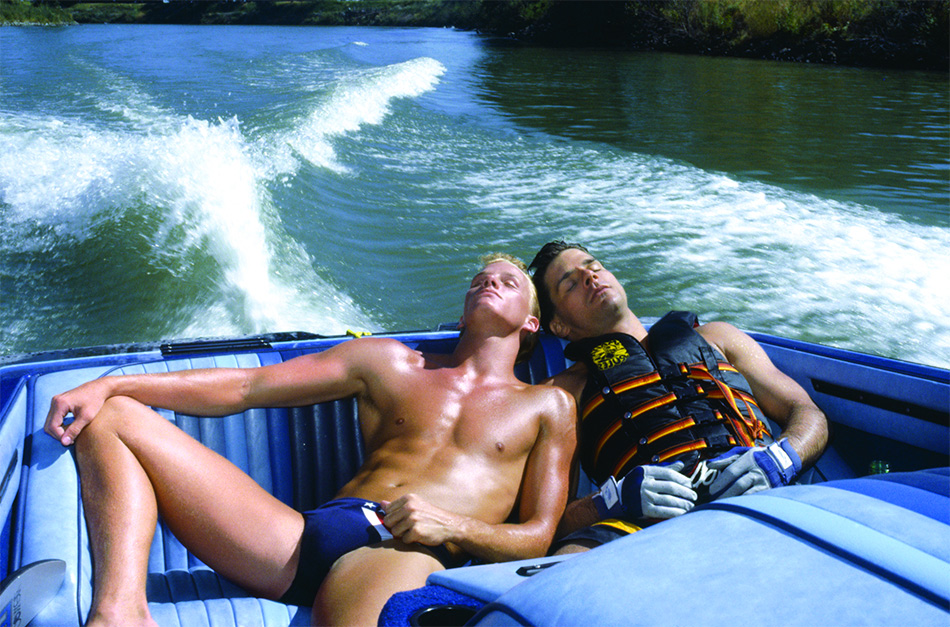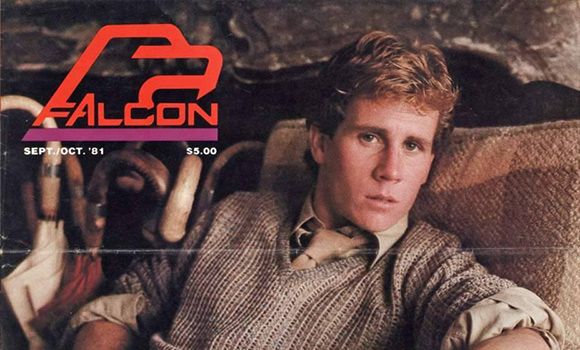Way back in 2009 when I and Mike Stabile both left The Sword, then in its third year, to pursue other things, Mike went off to begin work on a passion project he’d been talking about for many months. That project, a documentary covering the life and times of Falcon Studios founder Chuck Holmes, is now about to have its world premiere on Friday at the Boston LGBT Film Festival, and The Sword got Mike to tell us about the film.
The film is called Seed Money: The Chuck Holmes Story, and it was financed with help from NakedSword — as NakedSword’s second independent film presentation after I Want Your Love. After Boston it will be making its way to other festivals on the gay circuit, including QFest in St. Louis, with more announcements of screenings and other stuff to come.
J.W.: Hello! And welcome back to the Sword! How does it feel to have started a site and then come back to it, ahem, eight years later as an interview subject?
To quote Michael Corleone “Just when I thought I was out … they pull me back in.”

At first, it was just that he was this larger-than-life figure. Very colorful. At the time, Jack Shamama, who was a producer on the project, was working at Falcon and it had just been sold again, and they were throwing out all these photos — pictures of Chuck’s yachts, photos of Chuck with Al Gore — and we started talking about how to preserve the history.
I mean, this was a guy who not only built Falcon, but also laid the groundwork for so many major studios. You can pretty much trace a lineage of gay porn down through him. So many major directors — Steven Scarborough at Hot House, John Rutherford at COLT, Chi Chi LaRue, Bruce Cam and of course Chris Ward who now runs Falcon. They all got their start working for him.
After you left The Sword you started working on this documentary almost immediately, over five years ago. Tell me about what you thought the film was about at first, and what it ended up being about — assuming those two things are different.
At first I think I thought it was more about the more colorful — shall we say— aspects of Chuck’s story. The parties. The temper. The boys. And, of course, the lineage. But almost as soon as we got into it, he became more of a person than a caricature. The first interview we did was with Steven Scarborough, who was not only Chuck’s business partner but also his friend and lover, and he really gave us a portrait of a complex man. A guy with demons, perhaps, but also someone who really was exceptional at what he did, and who felt really passionate about gay rights and his particular role in it.
Tell me about some of the other people you got to speak about Chuck, and about the gay porn industry that existed when he started Falcon.
Well, one of the reasons we started on this originally was because people who were there at the beginning of the industry, in the early 70s, were dying. We first started talking about the project in maybe 2007, shortly after Matt Sterling died. We thought we’d just start making this as an oral history, just to preserve it. And then Ben Leon, who was shooting films from Raging Stallion got interested, and we thought well, why not make a documentary. This is over a period of years. We finally shot our first interview in 2009, with Steven.
We thought, well, if we get the people who were closest to Chuck — Steven Scarborough, John Rutherford, Chi Chi LaRue — we can just sort of do interviews with them and string it together. Ha! Almost immediately, I was really drawn to the early days of the business. John Travis, who was Chuck’s first cameraman, had been driving around the country selling 8-millimeter loops out the back of the trunk of his car. It was so illegal. Almost like drug running. People went to federal prison for selling porn. But you could tell from talking to them, when you COULD talk to them, that it was also really sort of fun. It was a scandal.

Who was the hardest person to track down and/or get to speak on camera about Chuck?
Oh, Jim Hodges, better known as John Travis. I’d get him on the phone, and then I’d drive out to Palm Springs to meet him, and, you know, crickets. Then I’d drive back and I’d hear from him again and nothing. We finally got an interview with him — although it was audio only — because he happened to show up at Jeff Stryker’s house while were were interviewing Stryker. And even then, it was like 15 minutes.
Is there anyone you never got who you wish you got?
Oh yeah, tons. I mean, I’d have love to have talked more with John Travis. I’d love to have done another interview with Vaughn Kincey (a.k.a. John Summers), who would only let us do an audio interview. I thought we’d be able to convince him later, but he died about six months later. He was an amazing storyteller, and had such a vast amount of history. We only scratched the surface. Kevin Williams, the 80s Falcon star was another one. I got him on the phone and he was hesitant and then … nothing. And, of course some of Chuck’s more famous friends like Calvin Klein, David Geffen. Made multiple attempts but no luck. I finally got into a conversation with Geffen on Facebook of all places. He wished me luck but had no interest in being involved.
What about footage? Did you have a tough time tracking down certain bits of archival footage or video?
I mean, there was almost no footage of Chuck for years. All we had was some shots of him in the b-roll of a Falcon movie, Command Performance, from 1992. And even the photos were hard to come by. We did dig up pieces here and there — I once spent five hours digging through boxes in someones garage in Monrovia, about an hour out of LA, looking for tapes that *might* have a few seconds of him at at Gay Video Guide Award. We pieced it together, but it was tough. So we tried to tell his story using the movies themselves.
What’s the most amazing thing you found while researching the film?
I still think that those early days are unmatchable. Chuck was sober in this later years, but in the 70s? It was ON. I mean, we don’t really get into it too much into the film, but the parties they used to throw were outrageous. There’s a legendary trip that Chuck took to New York at New Year’s, where they basically took all the bar-backs from Studio 54 home to an orgy.
What are you hoping the average viewer, outside of gay porn fandom, will take away from the film?
Well, I think that even gay people don’t think about the importance of gay porn to gay culture. Before Will & Grace, finding a positive representation of a gay person in mainstream media was so difficult. Porn really shaped a generation, gave them hope that there were other people out there like them, that if you left the small town or the farm or the family, you could replicate the freedom being shown in these very San Franciscan movies. I think Chuck thought his political work was his legacy — I mean, he was on the Board of Directors of the HRC and the Victory Fund, he had been to the Vice Presidential mansion, had dinner with Gorbechev, thrown lavish fundraisers at his home in Nob Hill for Democratic candidates. But those movies arguably had the most impact.

Alan Berliner makes these amazing documentaries based almost entirely on found footage, like Nobody’s Business and Intimate Stranger, and that was hugely influential — the idea that you would be able to illustrate a film without necessarily showing the people who were talking, or the people in it. And David Weissman’s The Cockettes was never far from mind. You know, taking a story that people think they know — in his case, 60s San Francisco — and really looking at it through a new lens. And I think I pulled some from Errol Morris, in terms of how to play with titles and archival footage to fuse it into a story.
So where do you actually get the seed money for Seed Money? How’d you pay for this thing?
I hustled! Actually, we raised about $25K through crowdfunding, which got us off to a nice start. We had a couple of private donors who came in with a few thousand each. And then there were credit cards — just like they say in the movies. We were lucky enough to have Falcon let us use the footage for free. And NakedSword.com generously came in with some finishing funds that really helped us close that gap. But I’ve still got a long way to go before I’m whole, as they say. I think the whole thing came in at about $80K, which is cheap for a movie, but it’s a hell of lot of money when most of it’s coming out of your pocket. It’s been a long couple of years in the salt mines.
And, I know, you’ve been working on several other things while working on this movie. Tell me about that stuff.
I’ve started another documentary, with Warhol star Holly Woodlawn, which is more verité — a little Grey Gardens-y, a little The Kid Stays in the Picture — less talking heads. And of course, I’ve been working to fight for the rights of sex workers, and sexual expression for places like the Free Speech Coalition. And writing when I can fit it in.
You have a pretty long view of porn of the last couple decades, having also started Gay Porn Blog in the early aughts, and I know you’ve written on this topic before. But what do you think are the biggest gains and losses in terms of porn content as you’ve watched the industry shift over the last ten years?
Well, in some ways we’re back to where we started in terms of content. Mostly, we’re shooting loops now — 15 minute vignettes, often in a bedroom or hotel room. The big budget projects are mostly done, or are at much smaller scale. You look at some of those 90s Falcon movies, in Hawaii or Australia or whatever, and it’s mind-blowing how much money they were spaying.
Professionally produced porn probably isn’t going away anytime soon, but where do you see it heading in the coming decade? Anywhere good?
We’re moving away from recorded content and more to webcams, certainly. I think that people want a more interactive experience — it’s so hot to talk to someone, even if just by text. To vocalize your desire to them. To have them wink at you, or do what you ask. It’s tremendously liberating. I don’t know that we’re there yet, but at some point, it’s a whole new ball game.
The trailer for Seed Money, below.
Previously: FALCON’S CLASSIC ‘THE OTHER SIDE OF ASPEN’ GETS A GORGEOUS HI-DEF RESTORATION


Aw man, it looks so interesting it’s a shame they couldn’t use a good mic for the interviews. Everyone sounds like they’re in the bathroom. I hate to see this kind of history preserved on the cheap.
Fascinating story, and Chuck was at once a visionary, and a pioneer.
Steven Scarborough was a HUGE part of this – creating/supporting the Falcon “look”, and doing best-in-class work.
Chuck had charisma, and a look of his own. He built a company through thick and thin ( LOL ,sometimes by Sick and Sin), but always had class and style. I so wish he was here now.
Falcon set the standard very high back in the days. I love their classic titles like Spring Training and Splash Shots – memories of summer (starring Kurt Marshall *swoon*).
Kurt Marshall was the man! Also had a thing for Scott O’Hara. Looking forward to watching this.
Who is the blond model in the tuxedo?
Tom Hartung. I read that he was a cameraman’s boyfriend at the time. Made just that solo scene for Falcon and some pics
Good interview about a good subject. Chuck Holmes seen to love his work…
Can’t wait to see this … and the Holly Woodlawn doc. Falcon was the gold standard for amazing gay porn. They could do no wrong. Then came the 21st century.
Sounds like a very interesting film, hope I get to see it sometime.